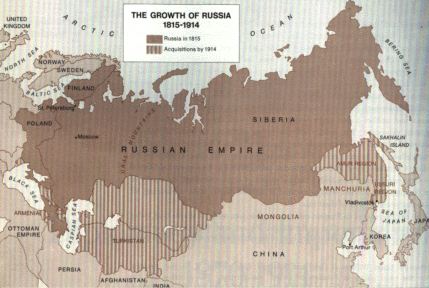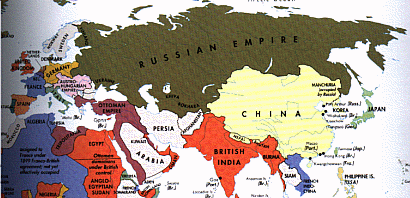Imperialism and Great Russian Nationalism
The Anglo-American relies upon personal interest to accomplish
his ends and gives free scope to the unguided strength and common
sense of the people; the Russian centers all the authority of
society in a single arm. The principal instrument of the former
is freedom; of the latter, servitude. Their starting-point is
different and their courses are not the same; yet each of them
seems marked out by the will of Heaven to sway the destinies of
half the globe. |
Czarist Russia is often not even mentioned as one of the great imperialist powers of Europe. The difference is that British, French, and German imperialists founded overseas empires, while the Czars simply began annexing adjacent lands. Its wars in Europe with Sweden, the Ottoman Empire, and Poland gave the Czars relatively little - but densely populated - territory. The centuries-long war against bordering indigenous peoples gave the Czars few new subjects, but an enormous land area stretching all of the way to Alaska.
Russia's conquest of the primitive peoples of Siberia and Asia was in many ways similar to the Indian wars of the United States. Siberian tribes of Ostiaks, Samoeds, Nenets, Tungus, Mongols, Iakuts, Iukagirs, Chukchis, Koriats, and Kamchadals all fell under Russian domination. Russian rule was frequently brutal, and deadly. To take but one example, out of about 30,000 native Aleuts who lived in Alaska prior to Russian conquest, a scant 3,000 remained when Alaska was sold to the United States in 1867.
The Czar's earliest conquests passed almost unnoticed: the Ukrainians and so-called "White Russians" (not to be confused with the pro-czarist forces during the Russian Civil War), although under Russian domination for centuries, were distinct ethnicities who struggled fiercely to retain their culture and way of life. Further west, Poles, Balts, Finns, and numerous other peoples fell under Russian rule. Poland and Finland both enjoyed considerable autonomy, but even light-handed Russian administration seemed harsh to peoples unaccustomed to it. During the 1800's, other small nations were forced to submit: Georgians, Chechens, Armenians, and numerous others. Mongolia and northern areas of China were added to the Czars' impressive portfolio of conquests.
Russian imperialism was already a difficult burden for subject peoples to bear, but it became worse whenever the urge to "Russify" them caught the Czar's ear. Particularly under the rule of Alexander III, minorities within the Russian Empire found that their native language and religion were under official attack. Poles, Jews, Finns, Muslims and other groups found their religions persecuted, their schools forced to teach solely in Russian, their marriages denied legal recognition, and worse. Jews in particular suffered from official economic discrimination and semi- official violence known as pogroms.

The great irony of history is that Russian imperialism was often overlooked simply because Russians did not have to board ships to conquer Asia. Russian imperialism was on par with, and often far worse than, British or French imperialism. Even the collapse of the Soviet Union has left a substantial portion of the Russian Empire intact, for while many subject peoples won their independence, others - such as the Chechens - still live under Russian domination.

